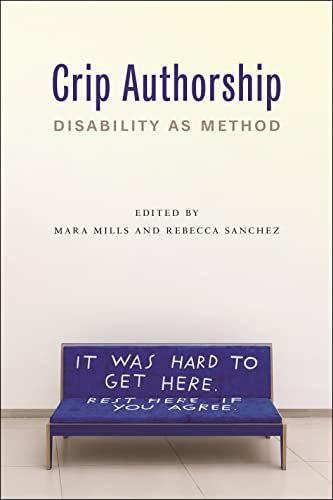
Crip Authorship: Disability as Method

“accessibility,” which disability studies scholars all too deeply understand to be a vexed wish, has too easily conspired with an unthought universal standard.
Rebecca Sanchez • Crip Authorship: Disability as Method
What if one collaborates in all aspects of the research, including theorizing, researching, developing, and outlining an article, but someone else writes up the notes, bullets, fragments, and so on and turns them into paragraphs? What if someone or multiple people talk while someone else writes it down—who is considered the author? Who is
... See moreRebecca Sanchez • Crip Authorship: Disability as Method
“Crip life invites us into fierce creativity. Because the world continues to treat us as worthless, creating new worlds is a matter of survival for us. Dreaming is a matter of survival” (Berne 2021, 9).
Rebecca Sanchez • Crip Authorship: Disability as Method
modes of considering the disabled body as something to think with rather than to think about”
Rebecca Sanchez • Crip Authorship: Disability as Method
how do neurodivergent people, often of necessity, create access in inaccessible terrain? How do neurodivergent people body-as-verb? Where and when are we getting (un)stuck in communicative exchange?
Rebecca Sanchez • Crip Authorship: Disability as Method
Minich (2016) asked that scholars reframe disability studies as a methodology rather than a subject, and Kim (2017) replied that disability itself should be shifted “from noun—an identity one can occupy—to verb: a critical methodology.”
Rebecca Sanchez • Crip Authorship: Disability as Method
Frantz Fanon’s prayer at the end of Black Skin, White Masks: “Oh, my body! Make me always a man who questions” (1986, 206).
Rebecca Sanchez • Crip Authorship: Disability as Method
it could include reclining chairs that allow people with ME/CFS to rest while making community in-person. Changing the dismissive attitude toward “contested” chronic illnesses may lead to better resources to manage symptoms—not toward a medical “cure” or elimination, but toward greater access to social worlds.
Rebecca Sanchez • Crip Authorship: Disability as Method
To live on a kind of “competence probation” is an everyday reality for many; to be required to continually, repetitively demonstrate capacity.